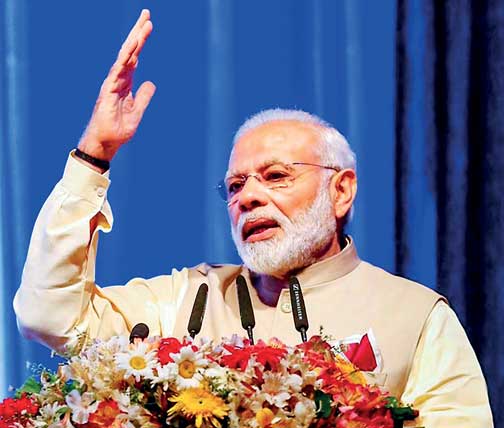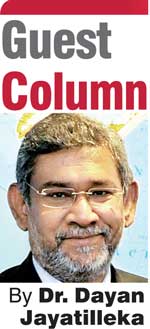Wednesday Feb 18, 2026
Wednesday Feb 18, 2026
Tuesday, 16 May 2017 00:00 - - {{hitsCtrl.values.hits}}
Prime Minister Modi’s two-day visit to Sri Lanka was supposed to be non-political. Yet, in his address to the International Vesak Conference at the BMICH, he laid out the Modi doctrine for Indo-Lankan relations and more especially for Sri Lanka. As the Indian TV station WION’s program ‘Gravitas’ correctly reported, ‘Modi Reshapes Sri Lanka Policy’. What a reshaping it was and what a shape it has now taken!
The Modi message was hardly non-political, or purely cultural and civilisational, being far more Kautilyan than Dharmaashokan. With the country’s top leadership—Government and Opposition—present, he prescribed the limits of this country’s sovereign existence.
This is what he says, on economics and security/strategy which are facets of the same thing: power relations between states:
(‘Modi: Security of India and SL indivisible’, The Island, 13 May, p1, lead story)
What is Prime Minister Modi telling us?
Who decided on the wisdom of upgrading and up-scaling our economic relationship? There have been numerous protests against ETCA. In many significant parts of the world, countries and peoples are turning away from doctrines and practices of “free flow across borders”, because they adversely affect the nations concerned—including most famously the USA and Britain. 
The suggestion is that the ‘up-scaled’, ‘free’ ‘cross-border’ flow based relationship with the neighbouring giant will involve “almost every sector of human activity”. Does it not mean that every area of human activity of Sri Lanka’s citizens, of the inhabitants of this small island, will be impacted upon, penetrated, shaped and perhaps even controlled by the vastly more powerful neighbour? Such a suggestion had never been entertained in Sri Lanka in its centuries and millennia old history. What then will happen to us over decades? Who will we become?
Sri Lanka has always valued and guarded its separate and distinct identity from its much bigger neighbour. Despite its size and location this island has always asserted its independent space to decide its own destiny, carefully calibrating its trading partnerships and cleverly balancing its relationships with the big powers globally, to its benefit, throughout the centuries.
It is doubtful if the Indian Prime Minister’s Vesak speech in Colombo would have been welcome in any country in the neighbourhood of India. In a more dangerous time, a close friend and ally of India, Vijaya Kumaratunga, said in his final speech (at Campbell park, early 1988) that even if his head were to be blown to bits by the Green Tigers or the JVP, he “would not permit Sri Lanka to be a playground of United States imperialism or the 26th state of India”.
After a 30-year separatist war and increased hostility from Tamil Nadu, the people’s resolve to strengthen their independence has only become firmer. It is unlikely that they will let an opportunistic, fickle, vacillating political class betray them.
Crux of the Modi doctrine
The crux of the Modi doctrine is contained in just two sentences, bringing together the economic and the strategic, which is exactly what the people of Sri Lanka will be rightly apprehensive of: 
“Because, the economic and social wellbeing of the people of Sri Lanka is linked with that of 1.25 billion Indians. Because, whether it is on land or in the waters of the Indian Ocean, the security of our societies is indivisible.”
Enlightened public opinion will see these as two bullets aimed at our sovereign, independent existence. Sri Lanka has never regarded its economic and social wellbeing as linked with that of 1.25 billion Indians. The Sri Lankan people are hardly likely to allow that to be the case.
We had an exemplary social welfare system which was upheld as a global model at one time. Later we opened up our economy, and that was one and a half decades before India did. We achieved higher growth, higher than India until recently. We have never regarded this country’s economic wellbeing as linked with the far more complex societies of federal India, with its uneven economic development and social issues of extreme poverty, overpopulation, entrenched caste consciousness—a form of social apartheid—and bride burning to name but a few of the pressing issues of social backwardness that India has to deal with.
If Prime Minister Modi had said ‘the neighbourhood’, or ‘South Asia’ or better still, ‘Asia’ or ‘Eurasia’, the people of Sri Lanka would have understood the broad direction towards which the region and even the global economy is turning. But he just said “1.25 billion Indians”. This, will be unacceptable to the Lankan people as a destiny and livelihood that is to be yoked to the chariot wheel of India. This places Sri Lanka in danger of becoming a peripheral unit, a dependency, of the Indian economy. Sri Lankans will not risk being dependent on the 1.25 billion Indians and be swallowed up by them.
National security
No sovereign, independent country’s security can be “indivisible” from that of another. This is why we speak of “national interest” and “national security”. No country’s security can be indivisible from another when one country’s security can be and has been threatened by the other; and the other contains a state unit of 80 million people, 18 miles away from the smaller country, which is hostile to the latter country.
According to Kautilya’s Arthashasthra, a state’s security is threatened precisely and inevitably by its neighbour—thereby rendering the security of a state eminently “divisible” rather than “indivisible” from the security of its neighbour!
Sri Lanka never considered its security indivisible from that of another country. Countries security interests may coincide, overlap—leading to varying degrees of cooperation, partnership and even alliance. But that is a sovereign decision of each country. No country can decree another country’s security and its own as indivisible. They are divisible precisely because they are two countries, two states, two sovereign and separate entities, with divisible borders and distinct destinies.
To consider Sri Lanka’s security as indivisible with India’s is well beyond the Indo-Lanka Accord and its annexures which recognised the geopolitical reality that given our asymmetries Sri Lanka must not do anything which will strategically harm or be hostile to our giant neighbour.
True, India is indispensable to Sri Lanka’s security and vice versa, but “indispensability” and “indivisibility” are two different things. Sri Lanka has always retained its right to decide on its security partnerships to protect its territorial integrity. Any trans-border, trans-state, unilaterally defined and prescribed “indivisibility of security” is a restrictive concept which precludes it from considering its own national interests above all else.
Though my old teacher of international relations, Prof Shelton Kodikara, would surely have traced Modi’s ‘Vesak discourse’ in Colombo back to the Indian Ocean-centric theories of K.M. Panikkar and thus posited a conceptual continuity, I would add or attribute two new reasons for the Modi doctrine. Firstly, the competition with a rising China in the Indian Ocean has led Modi to attempt a downward thrust of India’s power, extending its sphere of influence southwards, hardening and transforming it from a sphere of influence to a domain of secure possession, acquiring Sri Lanka or at least its north and east which contains Trincomalee. Secondly, Modi’s ideological lineage and mindset make it easier than it would be for a Congress leader, to think in terms of a Greater India, a quasi-empire—which extends to and incorporates the island of Lanka.
The reference to the sea clearly means that India exercises a veto over the passage through/via Sri Lanka, of Chinese shipping i.e. the shipping vital to China which unlike India has been a staunch friend of Sri Lanka and whose economic prosperity is vital to Sri Lanka and the rest of Asia not to mention the world. China is also the vital balancing factor that Sri Lanka has used to offset the hegemony of India and inter alia, Tamil Nadu.
The Modi doctrine seems to have its accompaniment in the Wickremesinghe doctrine. Going by the hybrid Modi-Wickremesinghe Doctrine, US, Indian, Japanese, British and European warships can and do dock in Sri Lankan ports while Chinese submarines are prevented. This is ‘balance’ and ‘even-handedness’ and ‘nonalignment’ in the composite ‘Modi-Yahapalana’ dictionary. It means that our fickle friends can dock their warships in our ports but our faithful friends cannot—all in the context of a competition in Asia where our fickle friends block our faithful friends.
A charitable and conventional explanation would be that Modi wants Sri Lanka to be a satellite, subordinate to Delhi. My own explanation is less charitable but perhaps more Realist. The Modi doctrine assumes that India’s new borders extend beyond and include Sri Lanka; that Sri Lanka lies within India’s borders; that Sri Lanka is borderless and has no borders or cannot and must not have borders, economic and political, that separate it from India.
In terms of the island’s domestic geopolitics, and the acceptance of Modi’s doctrine for us, we are incorporated within Greater India and therefore, the domestic balance tilts against the Sinhala majority and in favour of the Tamil minority, because the latter have 80 million co-ethnics as important stakeholders within India.
The security and strategic de-linking from China means that the Sinhalese are weakened twice over, because they will be cut-off from their staunch and economically powerful ally, while the latent separatist Tamil minority is strategically empowered by the borderless linkage with India and the Indian veto over our relations with China. The Sinhalese will be unable to balance off the US and India while the Tamils will be able to leverage them thanks to the diaspora and Tamil Nadu, and we would have given the Indo-US friends of the Tamil nationalists a huge leverage over us and our only home, this island.
In the Modi model, the only borders that Sri Lanka is expected to have are those of a federal state unit within India. In this sense, the sum total of Modi’s Vesak speech in Colombo is to change Sri Lanka’s status from a free, sovereign, independent country to a federal state of the Indian union! Both discourse and body language show that he already regards Sri Lankan leaders as Chief Ministers and no more—and for their part they already behave like Chief Ministers or aspirant ones, in a federation of which Modi is the Prime Minister!
Personalities like Sirimavo Bandaranaike, Ranasinghe Premadasa, Lalith Athulathmudali and even Anura Bandaranaike, not to mention Rohana Wijeweera, defended this island’s sovereignty in dealing with the rest of the world. While they—unlike the current political leaders, Government and Opposition—were made of sterner stuff, the people of Sri Lanka retain that spirit and many professional associations, trade unions and individuals have stepped up to fill the void.
No Indian leader or policy maker should rely on the whispered assurances of electorally vulnerable or avaricious politicians desperately vying for perceived guarantees of continued political life and succession, in a society which values and defends a volatile democracy, and patterns and outcomes prove “kaleidoscopic” (as my father used to write).
It is the ‘shaping spirit’, the ethos of this ancient island nation, which has asserted its independent identity and existence as distinct from and in contradistinction to the vast sub-continental mass, that will ultimately override all else, and prevail.